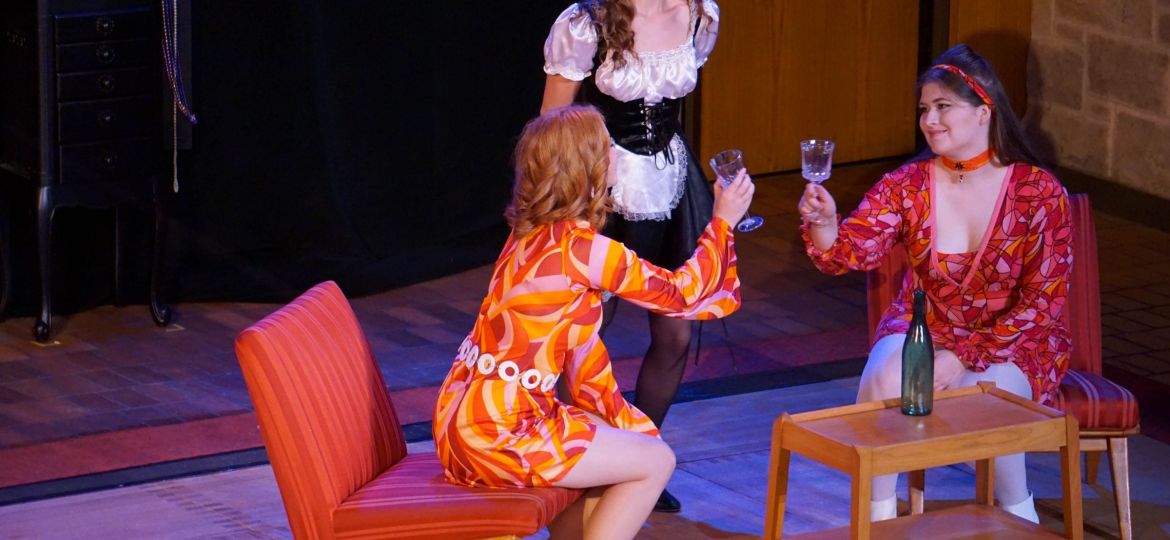
St. Olaf Lyric Theater performed two one-act operas – “Amelia Goes to the Ball” and “The Old Maid and the Thief” – as part of “An Evening of Menotti One Acts.” Gian Carlo Menotti composed both operas. Accompanied by the spectacular orchestra led by Dale Kruse, the actors enlivened the operas.
While the casts and plots were different in both operas, the orchestra performed for both. The orchestra included Olivia Skaja ’21 and Lauren Williams ’21 on violin, Ben Homan ’22 on viola, Ethan Schlenker ’20 on cello, Grayson Broesch ’22 on bass, Noah Livingston ’19 on flute, Colin Lang ’21 on oboe, Naomi Brandt ’20 on Bassoon and Nathan Cleaveland ’18 and Kathleen Kraulik on piano.
Janis Hardy and James McKeel founded St. Olaf Lyric Theater in 2006 with the help of Charles Forsberg, Dan Dressen and Alison Feldt. Having presented over 30 operas, operettas and musical productions, St. Olaf Lyric Theater aims to challenge and provide experience for students in all areas of musical productions.
Amelia Goes to the Ball
Kjell Redpath ’20 played the gruff husband, and in the first song entered the stage in a bright orange suit to set up the scene for the radical 1970s-style dress present throughout “Amelia Goes to the Ball.” Soon enough, the husband’s wife Amelia – played by Greta Ramsey ’19 – joined Redpath onstage.
Amelia was determined to attend the ball and would not be deterred, even though her husband learned about Amelia’s secret lover, played by Darrius Morton ’19. With the promise to attend the ball, Amelia tells her husband the name of her lover.
In a hilarious twist of events, Amelia’s husband, who originally intended to confront and “chat” with the lover, bonds with the lover and ignores Amelia. Still adamant about attending the ball, Amelia hits her husband over the head with a bottle (that actually breaks!) and blames the incident on her lover, who she pretends not to know when questioned by the police. Somehow, Amelia convinces the chief of police, played by Ian Schipper ’20, to accompany her, finally allowing Amelia to attend the ball.
With a hilarious plot, incredible acting and wonderful music, the only thing that would have made this opera better is louder and more articulate singing. Unfortunately for the opera-goers, half of the words were unintelligible, drowned out by the orchestra and the empty space of Urness Recital Hall. However, the casts’ expressive faces, dramatic movements and changes in inflection allowed the audience to follow the plot and enjoy this hilarious rendition of “Amelia Goes to the Ball.”
The Old Maid and the Thief
Originally written for NBC radio, the set of “The Old Maid and the Thief” merged a radio set with the house of the “old maid” to create an opera that delighted and entertained the audience. The opera began with Miss Todd, played by Siriana Lundgren ’19, and Miss Pinkerton, played by Hannah Phipps ’20, gossiping over an imaginary cup of tea, while the comical radio sound-effects team, played by Garrett Bond ’19 and Julia Woodring ’19 produced the sound effects of this tea party. Soon enough, Miss Todd invited the handsome beggar Bob, played by Lukas Jaeger ’21, into her house because she and her maid Laetitia, played by Sally Olmstead ’20, find him irresistibly good-looking.
In an amusing mix-up, Miss Todd and Laetitia think Bob the beggar is really an escaped thief and murderer and, to save their necks, begin stealing from their neighbors and town businesses. Upon learning that Bob is truly just a beggar and he does not love her, Miss Todd threatens to blame her crimes on him. In return, Bob and Laetitia run away together, but only after stealing everything that Miss Todd owns.
From the very beginning, it was clear that the auditory elements were very important to “The Old Maid and the Thief.” The radio-like scene emphasized the significance of sound, and asserted that sound is more important to the opera than a complex set or perfect acting.
From the entire cast’s clear articulation – especially Lundgren – to the comical sounds created by the radio, sound played an intrinsic role in this opera. Every word was intelligible, making the little nuances clear to the audience.
The sound effects team enlivened the scene as a comedic addition to the tea party — with crashing dishes, whistling teapots, kitchen timers, slamming doors and the clatter of tea cups. Furthermore, the radio-like set added a delightful twist to the average set.
St. Olaf Lyric Theater will perform a production of “Swede Hollow” by Ann Millikan in a joint production with Carleton College at the end of February.

